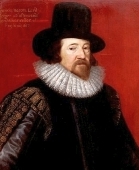
Problems with the Bacon case
The heyday of the Baconians is long since past. The movement thrived in the nineteenth century with the help of the very persuasive Mark Twain. Twain was utterly convinced that the Stratford man could not have been the author, and Bacon was then the only game in town.
After the initial sensation of the Bacon movement, it rapidly descended into the black hole of cryptology. Secret acrostics, anagrams, and various other attempts to tease out hidden meanings from the Shakespeare texts served mainly to brand all Shakespeare
scepticism as the domain of eccentrics and lunatics.
Bacon was undoubtedly a genius, a Renaissance polymath. But his interests were more cerebral, focusing on legal argumentation, empiricism and the scientific method, which he did much to formalize. The Shakespeare writer, also a Renaissance polymath, did share some common interests with Bacon and displayed an impressive knowledge of legal matters. But their habits of mind were quite different. And just like the Oxford case, the poetry of Bacon is sharply unlike Shakespeare's poetry. And where Oxford was at least reported to have been a playwright, there is no evidence Bacon ever wrote plays.
Unlike
Christopher Marlowe, there is
no evidence that Bacon could write verse of the quality found in the works of Shakespeare.
Bacon
Early scepticism about Shakespeare focused on Francis Bacon. An intellectual giant active during the period when the works of Shakespeare were produced, his defenders included Mark Twain, who was convinced that
Bacon wrote Shakespeare. Like Oxford, he possessed the necessary
education, the travel credentials, and the familiarity with court evident in the Shakespeare canon.

More about Bacon
SATURDAY, FEBRUARY 21, 2009
By Isabel Gortázar
To explore the Bacon case, visit
www.SirBacon.org.